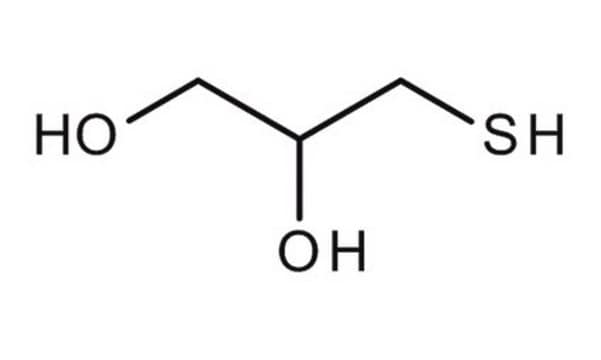All Photos(1)
About This Item
Linear Formula:
CH3CH(OH)CH2SH
CAS Number:
Molecular Weight:
92.16
EC Number:
MDL number:
UNSPSC Code:
12352103
PubChem Substance ID:
NACRES:
NA.23
Recommended Products
Quality Level
Assay
95%
form
liquid
refractive index
n20/D 1.486 (lit.)
bp
58-60 °C/17 mmHg (lit.)
density
1.048 g/mL at 25 °C (lit.)
SMILES string
CC(O)CS
InChI
1S/C3H8OS/c1-3(4)2-5/h3-5H,2H2,1H3
InChI key
FETFXNFGOYOOSP-UHFFFAOYSA-N
Related Categories
General description
1-Mercapto-2-propanol is a chain transferring agent that is the sixth series of hydrogen bonded 1,2-propanols which can be used to form polymeric chains with low molecular weight and short chain length.
Application
1-Mercapto-2-propanol can be used as a self-assembled monolayer on the gold surfaces with potential use in electrochemical applications. It may also be used as a chiral agent which can be used in the chemical analysis of enantiomers.
Storage Class Code
10 - Combustible liquids
WGK
WGK 3
Flash Point(F)
145.4 °F - closed cup
Flash Point(C)
63 °C - closed cup
Personal Protective Equipment
dust mask type N95 (US), Eyeshields, Gloves
Choose from one of the most recent versions:
Already Own This Product?
Find documentation for the products that you have recently purchased in the Document Library.
Customers Also Viewed
Microwave spectrum, conformation and intramolecular hydrogen bonding of 1-mercapto-2-propanol
Marstokk KM, et al.
Acta Chemica Scandinavica, 44, 339-345 (1990)
Non-local spatial frequency response of photopolymer materials containing chain transfer agents: II. Experimental results.
Guo J, et al.
Journal of Optics, 13(9), 095602-095602 (2011)
Microwave Spectrum, Conformation and Intramolecular Hydrogen Bonding of 1-Mercapto-2-propanol.
Marstokk KM, et al.
Acta Chemica Scandinavica, 44(9), 339-345 (1990)
Structural evolution of self-assembled monolayer of 1-mercapto-2-propanol on Au (1 1 1) in a N2 flow: an electrochemical and STM study.
Rhee CK and Kim YN
Applied Surface Science, 228(1-4), 313-319 (2004)
Ting F Zhu et al.
Proceedings of the National Academy of Sciences of the United States of America, 109(25), 9828-9832 (2012-06-06)
Prior to the evolution of complex biochemical machinery, the growth and division of simple primitive cells (protocells) must have been driven by environmental factors. We have previously demonstrated two pathways for fatty acid vesicle growth in which initially spherical vesicles
Our team of scientists has experience in all areas of research including Life Science, Material Science, Chemical Synthesis, Chromatography, Analytical and many others.
Contact Technical Service













